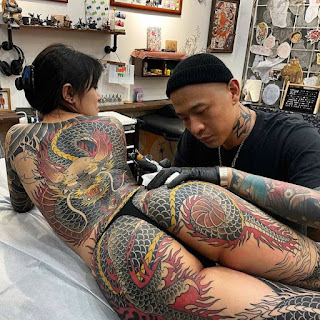https://twitter.com/Mangan150/status/1765052877511553262
https://twitter.com/theDr_com/status/1778868107609579717
https://twitter.com/degenrolf/status/1188675527831363584
https://twitter.com/SAPIENS_org/status/1489931900898713605
Innate immune responses involve general reactions to foreign material. So getting a new tattoo triggers your immune system to send white blood cells called macrophages to eat invaders and sacrifice themselves to protect against infection.
Your body also launches what immunologists call adaptive responses. Proteins in the blood will try to fight and disable specific invaders that they recognize as problems. There are several classes of these proteins—called antibodies or immunoglobulins—and they continue to circulate in the bloodstream, on the lookout lest that same invader is encountered again. They’re at the ready to quickly launch an immune response the next time around.
This adaptive capacity of the immune system means that we could measure immunoglobulins in saliva as approximations of previous stress caused by tattooing.
...
We collected saliva at the start and end of each tattoo session, controlling for the tattoo duration. We also measured recipients’ weight, height, and fat density to account for health. From the saliva samples, we extracted the antibody immunoglobulin A, as well as the stress hormone cortisol and inflammatory marker C-reactive protein. Immunoglobulin A is considered a frontline immune defense and provides important protections against frequent pathogens like those of the common cold.
By comparing the levels of these biological markers, we determined that immunoglobulin A remains higher in the bloodstream, even after tattoos heal. Furthermore, people with more time under the tattoo needle produced more salivary immunoglobulin A, suggesting an enhanced immune response to receiving a new tattoo compared to those with less or no tattoo experience. This effect appears to be dependent on receiving multiple tattoos, not just time passed since receiving one. This immune boost may be beneficial in the case of other skin injuries and for health in general.
Tattooing seems to exert a priming effect: That’s what biologists call it when naive immune cells are exposed to their specific antigen and differentiate into antibodies that remain in the bloodstream for many years. Each tattoo prepares the body to respond to the next.
Other studies find that short-term stress benefits the immune system. Stress’ bad rap comes from chronic forms that really do undermine immune response and health. But a little bit is actually good for you and prepares your body to fight off germs. Regular exercise provides immune function benefits through repetition, not necessarily single visits to the gym. We think this is similar to how each tattoo seems to prepare the body for vigilance.
...
Tattoos may provide visual evidence that others home in on to identify healthy mates or hardy friends. Such signals of fitness have been compared to peacock tail feathers, which would be too much of a burden if the peacock were not hale enough to escape predators.![]()
https://evostudies.org/2015/04/tattooing-primes-the-immune-system/
The idea is that, much like the coloring of bird feathers is believed to signal resistance to parasites (though not empirically demonstrated, as far as I can tell—e.g., as this study of Steller’s jays by Zirpoli et al suggests), a well-done tattoo that is vibrant, heals quickly, & maintains form or color tells me that you have a good immune system.
...
However, Johnna also collected saliva samples before & after the tattooing sessions & quantified the number of tattoo sittings, hours tattooed, & number of tattoos people had. She compared salivary immunoglobulin A (SIgA) to these indices of lifetime tattoo experience & found a robust effect. IgA is a metabolically expensive, highly conserved frontline defense against gastrointestinal & respiratory infections. Because it is produced continually, somatic energy depletions should result in drops in IgA production. We predicted that the immune systems of people with more tattoo experience would have adjusted over time, allostatically, & be less negatively effected—that it would provide an inoculation-like effect. And that is exactly what we found.
We reason that people who don’t heal up well after tattooing aren’t likely to get a lot of tattoos, so tattoo experience should be a good signal of something like that.
The second, the “upping-the-ante” hypothesis, draws on costly signaling to suggest that tattooing & other immunologically stressful forms of body modification advertise one’s fitness. This is especially pertinent in our current environment where healthcare has reduced the pathogen-load and hence the pressure to utilize “good genes” approaches in mating strategies. In environments where health is relatively stable, purposefully stressing the immune system is a way of “upping-the-ante.”
I would add that the “upping-the-ante” model can be linked to the behavioral immune system concept. Experimental studies of the behavioral immune system have demonstrated that heterosexual female attraction to indicators of high genetic-quality in males (e.g., masculinized faces) increases when primed with disgust (Watkins et al. 2012). What this means is that when the playing field is relatively even and environmental pathogen-loads are low, presenting minimal danger, mating constraints are reduced and all offspring have a relatively high chance of survival. But when pathogen-loads are higher, as signified by festering wounds, fecal material, or other “disgusting” potential disease vectors, mating constraints are increased, and there is an increased female tendency to prefer male mates whose genetic quality will increase the probability of offspring survival. Thus tattooing and costly body ornamentation may alter that playing field by enabling individuals to advertise their immunological quality relative to others through broadcasting their ability to withstand trauma or pain.
...The innoculation hypothesis is the biological correlate of the upping-the-ante theory. Whether the Carmen et al models suggests that tattooing advertises underlying quality, the innoculation theory is based in traditional warrior tattooing actually confers strength & protects against enemy arrows. We suggest that tattooing not only stimulates immunological reaction & demonstrates ones capacity to withstand stress & heal but that it induces an allostatic response, resulting in a higher threshold for stressor-related trauma to the system. To test this, we are measuring salivary immunoglobulin A (SIgA) before & after tattoo sessions in individuals with varying tattoo experience. IgA is the antibody that lines the respiratory & gastrointenstinal tract as a front line against pathogen. It is metabolically expensive but tightly conserved in mammals, suggesting its importance as a defense against common ailments. When the body is stressed & energy is allotted elsewhere, IgA production drops, & we get sick. We suggest that people who have habituated their bodies to stress, such as athletes or tattoo enthusiasts, will have smaller drops in SIgA due engaging in a stressful activity (pre- to post-tattoo session, for instance).
With the risk of life-threatening infections and a permanent marking that is nearly impossible to fake, biologists believe ancient tattoos are another form of costly honest signaling. Like Williams’s display of bravery to capture victory and Jocelyn’s affections, body ink may have been used as an evolutionary signal to potential partners about the ability to withstand physical pain and fight off infections. By attracting mates, thus increasing chances of reproduction, the pain and risks of this ritual of self-injury may have had cultural and evolutionary benefits that outweighed the costs.
...
Dr. Christopher Lynn, Associate Professor in the Department of Anthropology at the University of Alabama, has investigated costly honest signaling theory through the lens of the immune system. Lynn and colleagues compared overall tattoo experience in American Samoans, a culture in which body ink plays an integral role, to markers of immune system response. Immune response was assessed by measuring the amount of two substances in the subjects’ saliva: cortisol and IgA. Cortisol is a hormone released during stress to suppress the immune system and return it to baseline activity, while IgA is an immune marker that serves as the first line of defense for bacterial infections and viruses.
Individuals with more tattoo experience may have immune systems habituated to frequent stressors to the skin, priming them to fight off infections.
Compared to tattoo novices, Lynn’s research shows those with more overall experience with tattoos had elevated levels of IgA in their saliva after getting a new tattoo. Therefore, individuals with more tattoo experience, such as more inking sessions or years having tattoos, may have immune systems habituated to frequent stressors to the skin, priming them to fight off infections.
Tattoos are thought to have served as a costly honest signal of toughness and health for thousands of years. Although tattoos are likely not the cure to the common cold, Lynn’s work demonstrates that the cultural and evolutionary history of permanent body art may have biological impacts. And while it might not make me a great warrior, that just might help me fight through the pain during my next tattoo.
Does your tattoo make a statement about you? If you’re an attractive woman, it apparently does, regardless of your intention.
And that statement is: “I’m easy!”
That’s the implication of new research from France, which found men are more likely to approach a woman lying on the beach if she has a butterfly tattoo on her lower back.
The guys in this study didn’t think the body art made her more attractive. But they believed it increased the likelihood of her being receptive to their romantic overtures.
The “stereotype of promiscuousness associated with tattoos” may or may not be accurate, researcher Nicolas Gueguen of the Universite de Bretagne-Sud writes in the Archives of Sexual Behavior. But this study suggests many men clearly believe it, and act accordingly.
Previous research provides some preliminary evidence their instincts are sound. A Polish study published last year found adults with tattoos or piercings “had their first intercourse statistically earlier, and were more sexually active.” Another recent study by Gueguen found that French college students with tattoos and/or piercings “reported earlier experiences of sexual intercourse than did non-pierced and non-tattooed students.”
But as he notes, this raises a chicken-and-egg question: Does a tattoo really signal greater openness to sex, or do tattooed women simply get solicited more often, increasing the odds of them becoming sexually active? That remains to be studied, along with the impact of having multiple tattoos.
In any event, women should keep in mind that by getting a tattoo, they are sending a signal—one that gets picked up by males on the prowl. You may see a butterfly, but he sees an opportunity.
https://x.com/eyeslasho/status/1824470605766484152
https://twitter.com/KirkegaardEmil/status/1616686430906118144
Extrapolating from this result, Guéguen stated that tattooed women are seen as more promiscuous.
These findings add to multiple lines of evidence showing how men value women's physical attributes when judging and interacting with them. A healthy body of research indicates that men exalt beauty in both long-term and in short-term mating. Studies also show that various aspects of female appearance are used to evaluate their “mating value,” although bodily attributes are not the only criteria that are relied upon. Clothing appearance or color, cosmetics, and hair color have been linked to men’s approaches to and evaluations of women. Consistent with these studies, the results suggest that tattoos also serve as a signal to men of heightened sexual intent and/or receptivity.
Guéguen interprets the results from an evolutionary perspective. Like cosmetics or clothing, some women may adorn tattoos as a way to enhance their appeal to men and, in turn, to attract more males. A woman has a better chance of choosing a mate of “higher quality," the thinking goes, when there are more from which to choose. Tattoos may then serve as an effective means to capture male attention. Along similar evolutionary lines, men are driven to mate with many women to spread their genes. Logic then dictates that they will pursue women who display more sexual receptivity. Again, like cosmetics and clothing, men may see tattoos as advertising greater interest in sex on the part of women.
Guéguen is quick to point out that this study has its share of limitations, and he recommends that future research should focus on whether the association between tattoos and promiscuity is based on men's stereotypes or real experiences. Nonetheless, this study offers some novel insights into why, when it comes to tattooed women, some men see body art and others see a “tramp stamp.”
Are People With Tattoos More Sexual?
So we know that men are more likely to approach tattooed women; more likely to think they’d be open to dating; and more likely to assume they’re open to sex. But are those beliefs true?
Polish researchers explored the issue in a recent survey of 88 young adults, both men and women, 60 of whom were ink-free, and 28 of whom had tattoos. They found that people with tattoos are slightly more sexually active than the non-inked—but not enough to make any real difference.
Compared with participants without body art, those with tattoos had first intercourse a little younger, had a few more lifetime sex partners, were somewhat more sexually active, and were a bit more adventurous (i.e., they had more sex outside their bedrooms).
david smith@ii1111·Jun 2, 2019 Replying to @DegenRolf
Interesting. Now do woman’s rear pantyline tattoos.
MassFormation_muh kuh@muh_kuh_tw Replying to @DegenRolf
I am pretty sure there were studies before about the difference in sexual availability of women with tattoos with data that showed that women with tattoos had more "relations" with more partners than others.
Galbarczyk and Ziomkiewicz's study also revealed that women find tattooed men to be more masculine, dominant, and aggressive, traits associated with both elevated levels of testosterone and overall good health. Studies show that women tend to find these personality characteristics desirable, especially under certain conditions such as living with a consistent threat of crime and violence. In our ancient past, these traits would have been especially valuable because men who possessed them in higher levels could provide greater protection to their mates and children.
Tattoos have evolved as a form of art and personal expression, but they may still alter our perception of the men who sport them, probably far more than we realized.




















































